Tommy Tuberville and Joe Manchin propose NIL reform legislation
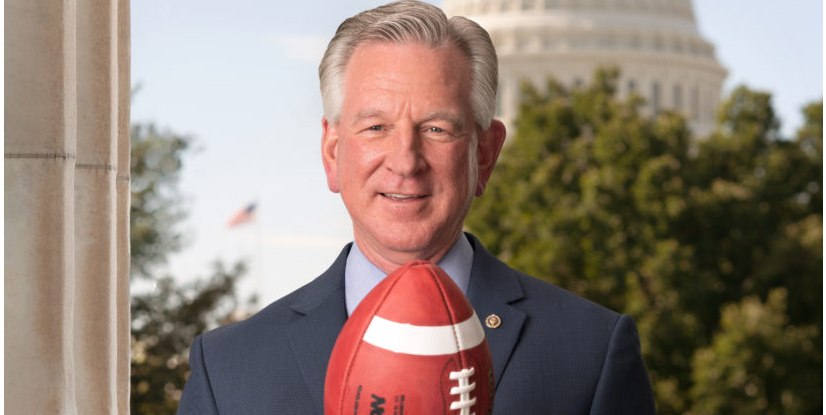
On Tuesday, U.S. Senators Tommy Tuberville (R-Alabama) and Joe Manchin (D-West Virginia) introduced the Protecting Athletes, Schools, and Sports (PASS) Act of 2023 to reform name image and likeness (NIL) standards in college sports. The sponsors say that their legislation protects student-athletes, maintains fair competition and compensation, strengthens transparency, and preserves the time-honored tradition of college sports. “Student-athletes should be able to take advantage of NIL promotional activities without impacting their ability to play collegiate sports,” Sen. Tuberville said. “But we need to ensure the integrity of our higher education system, remain focused on education, and keep the playing field level. Our legislation with Senator Manchin will set basic rules nationwide, protect our student-athletes, and keep NIL activities from ending college sports as we know it.” “As a former college athlete, I know how important sports are to gaining valuable life skills and opening doors of opportunity,” Sen. Manchin said. “However, in recent years, we have faced a rapidly evolving NIL landscape without guidelines to navigate it, which jeopardizes the health of the players and the educational mission of colleges and universities. Our bipartisan legislation strikes a balance between protecting the rights of student-athletes and maintaining the integrity of college sports. I urge my colleagues on both sides of the aisle to consider this commonsense legislation as a way to level the playing field in college athletics.” The sponsors claim that two years after the U.S. Supreme Court decided National Collegiate Athletics Association v. Alston (Alston), this bipartisan legislation would finally create a national standard for Name, Image, and Likeness (NIL). This bill marks the culmination of a year-long initiative in which the Senators actively engaged with stakeholders to create these commonsense guidelines for the NIL system. Specifically, the PASS Act would protect student-athletes by requiring collectives and boosters to be affiliated with a college or school. It would also encourage establishing a national standard for NIL. The PASS Act would preserve Title IX and ensure that nothing in the PASS Act affects the rights of any student-athletes or any programs funded through Title IX. Sponsors say that it also protects higher education institutions by ensuring that schools, conferences, and associations are not liable for their efforts to comply with the PASS Act; and by prohibiting NIL agreements that involve alcohol, drugs, or conflict with existing school and conference licenses. It also requires student-athletes to ask permission to make use of existing intellectual property (IP). Sponsors say that the PASS Act would preserve the future of college sports by prohibiting inducements. They also claim that it also improves the transparency of NIL activities by requiring agents and collectives to register with a regulating body and establishes a public-facing website to publish anonymized NIL data, and enquires all NIL contracts to be disclosed within 30 days. The PASS Act moderate the Transfer Portal by requiring student-athletes to complete their first three years of academic eligibility before allowing them to transfer without penalty, subject to a few exceptions. Tuberville and Manchin say that it ensures the health and safety of student-athletes by guaranteeing health insurance for sports-related injuries for uninsured student-athletes for eight years following graduation from a 4-year institution. The PASS Act would also require institutions generating more than $20 million and $50 million in athletics revenue to pay out-of-pocket expenses for two and four years, respectively. It also requires institutions to honor the original scholarship commitment made to a student-athlete and implements a Uniform Standard Contract for student-athlete use for NIL deals. Sponsors say the bill will also enhance the curriculum on financial literacy, NIL rights, and related legal and regulatory issues while strengthening enforcement and oversight by directing the NCAA to oversee and investigate NIL activities and report violations to the Federal Trade Commission. In June 2021, the NCAA Division I Board of Directors announced an “interim” policy suspending its rules relating to NIL compensation until federal legislation is enacted or until the NCAA adopts new rules. Following this announcement, there has been a push for Congress to act swiftly to provide clarity on NIL compensation. In 2022, Senators Manchin and Tuberville solicited feedback from athletic leaders, including university athletic directors, administrators, associations, collectives, and student-athlete groups, to build consensus around this bipartisan legislation. “The NCAA is transforming how it serves student-athletes by mandating Division I schools offer enhanced health, wellness, and academic protections and is moving ahead to support student-athletes as they monetize their NIL rights, but there are some challenges facing college sports that only Congress can address,” said NCAA President Charlie Baker. “The NCAA is encouraged by the significant, student-athlete centric reforms included in the Protecting Athletes, Schools, and Sports Act of 2023 (“PASS Act”), introduced today in the United States Senate. This important legislation is a major step in the right direction to ensure the health and safety of student-athletes, includes key measures to increase consumer protections and transparency in the NIL market, and aims to protect women’s and Olympic sports. There is clearly growing bipartisan interest in taking legislative action to create a stable, sustainable, and equitable foundation for future generations of student-athletes, and we are committed to working with all stakeholders to get this done.” “Auburn University appreciates the efforts undertaken by Senators Tommy Tuberville and Joe Manchin to create a national framework for NIL that establishes clear rules and addresses the patchwork of conflicting state laws governing collegiate athletics,” said Auburn University President Christopher B. Roberts. “We look forward to continuing to work with these offices, other members of the House and Senate, and the Southeastern Conference as this process continues.” “We love and celebrate collegiate athletics, but the landscape has changed dramatically as schools and student-athletes are now forced to navigate a patchwork of inconsistent regulations regarding Name, Image, and Likeness,” said West Virginia University President Gordon Gee. “This is not sustainable. That is why I am so glad for Sen. Manchin’s leadership and encourage Congress to provide the necessary direction at the federal level to create a pathway for establishing a common set of ground rules related to NIL, as well setting guard rails around the transfer portal.” “We are appreciative to the Senators for
Stark political divides loom as U.S. governors gather

With stark political divides on abortion, gun violence, and other issues threatening to overshadow their meeting, the nation’s governors sought to find common ground — on other issues. The National Governors Association formally kicked off its summer gathering Thursday, the first in-person meeting since 2019, before the COVID-19 pandemic. It follows recent U.S. Supreme Court rulings that have deepened the rift between red and blue states by overturning Roe v. Wade and striking down gun restrictions in New York. Leaders say there’s still room for bipartisanship. “It’s about trying to find things that we can work on together, and that’s plentiful,” said Arkansas Gov. Asa Hutchinson, a Republican who is wrapping up his yearlong term as the association’s chair. Hutchinson is handing the reins of the group to Democratic Gov. Phil Murphy of New Jersey, who will serve as its next chair. The two governors last month announced a bipartisan task force to make recommendations on preventing mass shootings following the massacre at a Texas elementary school that killed 19 children and two teachers. The task force was announced before President Joe Biden signed into law a sweeping, bipartisan gun violence measure that includes billions in new funding for mental health and school safety. The task force is comprised of eight governors, equally divided between Republicans and Democrats. Hutchinson said he sees the group helping shepherd that law’s implementation at the state level. Republican Gov. Spencer Cox of Utah, a member of the task force, acknowledged that any change to gun policy would invite controversy in his state, yet he encourages politicians to listen to proposals from across the political spectrum, including funding for school security, counselors, gun buybacks and red flag laws. “I’ve asked everyone to be open to every conversation,” Cox, the association’s incoming vice chairman, said in a press conference last month. The public agenda at the event in Maine avoided any high-profile partisan issues. Sessions on Thursday featured Intel CEO Patrick Gelsinger and the leader of a global robotics competition for a discussion of computer science education. Another session focused on travel and tourism. The governors also held several other events, including a mixer Wednesday evening and a scheduled lobster bake Thursday evening. Security was tight with road closures and a large police presence. Organizers declined to say if there was a specific threat or concern. Nineteen governors, including the governor of Puerto Rico, attended the event. Missing were governors of several large states, including California Gov. Gavin Newsom, Texas Gov. Greg Abbott, New York Gov. Kathy Huchul, and Florida Gov. Ron DeSantis. Hutchinson said he doesn’t see the governors association addressing abortion following the reversal of Roe. That ruling has pitted states against each other, with “trigger” bans taking effect almost immediately after the ruling in a number of states. Republicans in some states are looking at ways to prevent women from going out of state for abortions, steps that could include going after abortion providers. In response, some Democratic governors have signed measures banning their state’s law enforcement agencies from enforcing other states’ abortion bans. That includes Democratic Gov. Janet Mills, who formally welcomed the governors to her state on Thursday. When she signed an executive order last week, Mills said she “will stand in the way of any effort to undermine, roll back or outright eliminate the right to safe and legal abortion in Maine.” Partisanship was underscored on the eve of the gathering as New Hampshire Gov. Chris Sununu campaigned alongside fellow Republican Paul LePage, a former Maine governor who hopes to unseat Mills. Newsom, the governor of California, has even run a campaign ad in Florida criticizing that state’s Republican leaders. And protesters supporting reproductive choice gathered outside an event some of the governors attended on the Portland waterfront. Nonetheless, Hutchinson said the group has been able to work together on other issues, being a voice for the states during the COVID-19 pandemic and during negotiations over the bipartisan infrastructure package. Massachusetts’ Republican Gov. Charlie Baker said the governors tend to get along with each other — and they tend to focus on things where they can get results instead of areas of disagreement. “While we will disagree on different issues, we as a group have much more in common than what sets us apart,” said Mills, the host governor. Hutchinson’s chairmanship of the group has elevated his national profile as he considers running for president in 2024. The two-term governor, who leaves office in January, has criticized former President Donald Trump and has urged fellow Republicans to move on from the 2020 election. Murphy is coming into the chairmanship after narrowly winning reelection as governor last year. An unapologetic progressive, he recently signed legislation enshrining abortion rights into law and a new package of gun control bills. Even though they’re at opposite ends of the political spectrum, Hutchinson had words of praise for his successor. “Part of being a human being is that you recognize good quality that you see in people, even though we disagree fundamentally, and you’re on a different team. I think that’s needed in America today,” he said. Republished with the permission of The Associated Press.
Anthony Fauci says early reports encouraging about omicron variant
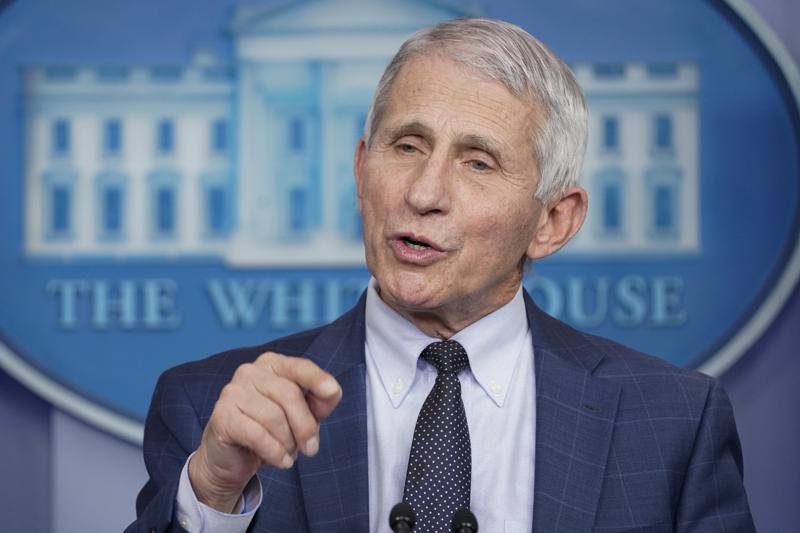
U.S. health officials said Sunday that while the omicron variant of the coronavirus is rapidly spreading throughout the country, early indications suggest it may be less dangerous than delta, which continues to drive a surge of hospitalizations. President Joe Biden’s chief medical adviser, Dr. Anthony Fauci, told CNN’s “State of the Union” that scientists need more information before drawing conclusions about omicron’s severity. Reports from South Africa, where it emerged and is becoming the dominant strain, suggest that hospitalization rates have not increased alarmingly. “Thus far, it does not look like there’s a great degree of severity to it,” Fauci said. “But we have really got to be careful before we make any determinations that it is less severe or it really doesn’t cause any severe illness, comparable to delta.” Fauci said the Biden administration is considering lifting travel restrictions against non-citizens entering the United States from several African countries. They were imposed as the omicron variant exploded in the region, but U.N. Secretary-General Antonio Guterres has blasted such measures as “travel apartheid.” “Hopefully, we’ll be able to lift that ban in a quite reasonable period of time,” Fauci said. “We all feel very badly about the hardship that has been put on not only on South Africa but the other African countries.” Omicron had been detected in about a third of U.S. states by Sunday, including in the Northeast, the South, the Great Plains, and the West Coast. Wisconsin, Missouri, and Louisiana were among the latest states to confirm cases. But delta remains the dominant variant, making up more than 99% of cases and driving a surge of hospitalizations in the north. National Guard teams have been sent to help overwhelmed hospitals in western New York, and Massachusetts Gov. Charlie Baker issued an emergency order requiring any hospitals facing limited patient capacity to reduce scheduled procedures that are not urgent. U.S. officials continued urging people to get vaccinated and to receive booster shots, as well as take precautions such as wearing masks when among strangers indoors, saying anything that helps protect against delta will also help protect against other variants. Even if omicron proves less dangerous than delta, it remains problematic, World Health Organization epidemiologist Dr. Maria Van Kerkhove told CBS “Face The Nation.” “Even if we have a large number of cases that are mild, some of those individuals will need hospitalizations,” she said. “They will need to go into ICU, and some people will die. … We don’t want to see that happen on top of an already difficult situation with delta circulating globally.” Two years into the outbreak, COVID-19 has killed over 780,000 Americans, and deaths are running at about 860 per day. More than 6,600 new hospital admissions are being reported daily, according to tracking data from the U.S. Centers for Disease Control and Prevention. COVID-19 cases and deaths in the U.S. have dropped by about half since the delta peak in August and September, but at more than 86,000 new infections per day, the numbers are still high, especially heading into the holidays, when people travel and gather with family. Republished with the permission of the Associated Press.
Joe Biden announces Uber, Lyft rides amid July 4 vaccine push
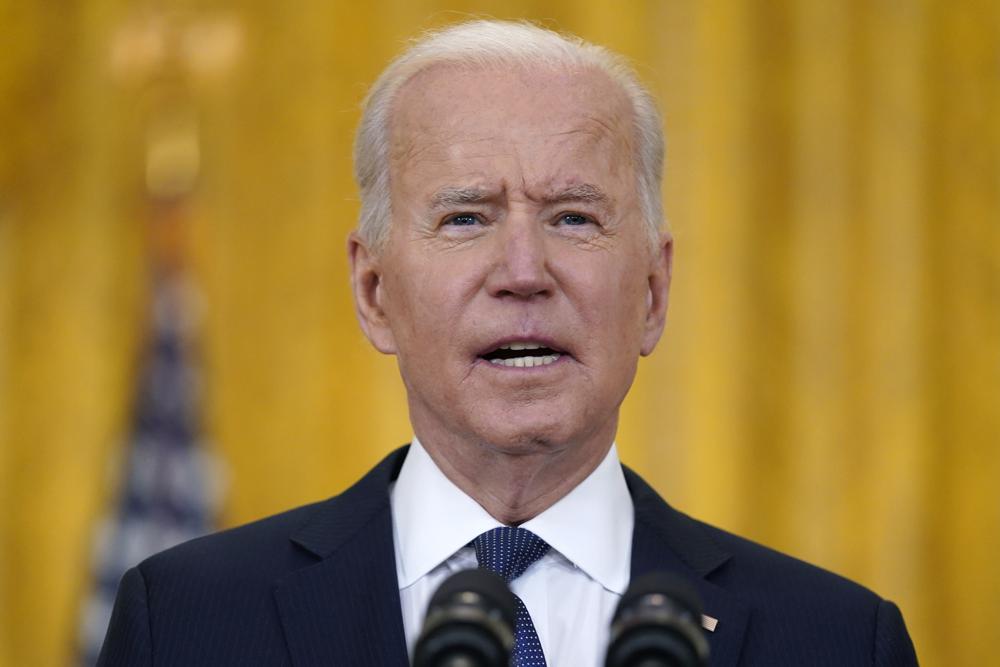
President Joe Biden is highlighting new efforts to encourage Americans to get COVID-19 shots, including free rides to and from vaccination sites from ride-sharing companies Uber and Lyft, as the pace of shots nationally declines and he looks to meet his July Fourth inoculation targets. The partnership with the ride-sharing companies marked the latest in a series of government-encouraged efforts to increase access to shots, including numerous state and local efforts to provide perks to drive Americans to get vaccinated. It comes as Biden met virtually with a bipartisan group of governors Tuesday to share best practices for encouraging Americans to roll up their sleeves. “We have to make it easier and more convenient for all Americans to get vaccinated,” Biden said, as he met with Utah Gov. Spencer Cox, Massachusetts Gov. Charlie Baker and Ohio Gov. Mike DeWine, all Republicans, as well as Democratic Govs. Michelle Lujan Grisham of New Mexico, Janet Mills of Maine, and Tim Walz of Minnesota. “I think that’s really stepping up,” Biden said of the partnership with the ride-sharing companies. Biden also announced new funding through the Federal Emergency Management Agency for community outreach efforts to encourage Americans to get vaccinated, as well as a new initiative to host federally supported vaccination sites at community colleges. During the meeting, Biden asked the governors to share their innovations to boost vaccine uptake, from mobile vaccination clinics to incentives like tickets to minor league baseball games or promotions at retailers like L.L. Bean. “I think you’ve done incredible work,” Biden said of the governors. “None of this could work without your leadership.” Cox pressed Biden for assistance in highlighting the role of vaccinations bringing about a return to normalcy, echoing a growing complaint of public health professionals and others at the caution of the Biden administration in releasing guidance for those who are fully vaccinated. “One area where we can use some help from the White House and others, and that is modeling what a fully vaccinated person can do,” said Cox. “I like to say that we have fully vaccinated people, we should start acting like it,” calling it a motivating force for those who haven’t yet gotten a shot. “I think you’re going to see a more aggressive effort on our part to lay out that it’s not only you can hug your grandchildren, you can do a lot more,” Biden responded. Biden’s meeting comes a week after he set a new goal of delivering at least one dose of vaccine to 70% of adult Americans by Independence Day and fully vaccinating at least 160 million by then. On Tuesday, the White House told governors that states had chosen not to accept 2.5 million doses of the nearly 18 million available to them this week due to declining interest. The administration did not reveal the complete list, though states like Iowa have been vocal about not needing additional vaccine supply given current demand. The nation’s vaccination rate has dramatically slowed in recent weeks. According to the Centers for Disease Control and Prevention, an average of about 690,000 Americans are getting their first dose of vaccine daily, down from a peak of more than 1.9 million per day a month ago. Biden’s virtual meeting with governors was streamed online without reporters present. Republished with the permission of the Associated Press.
States easing virus restrictions despite experts’ warnings
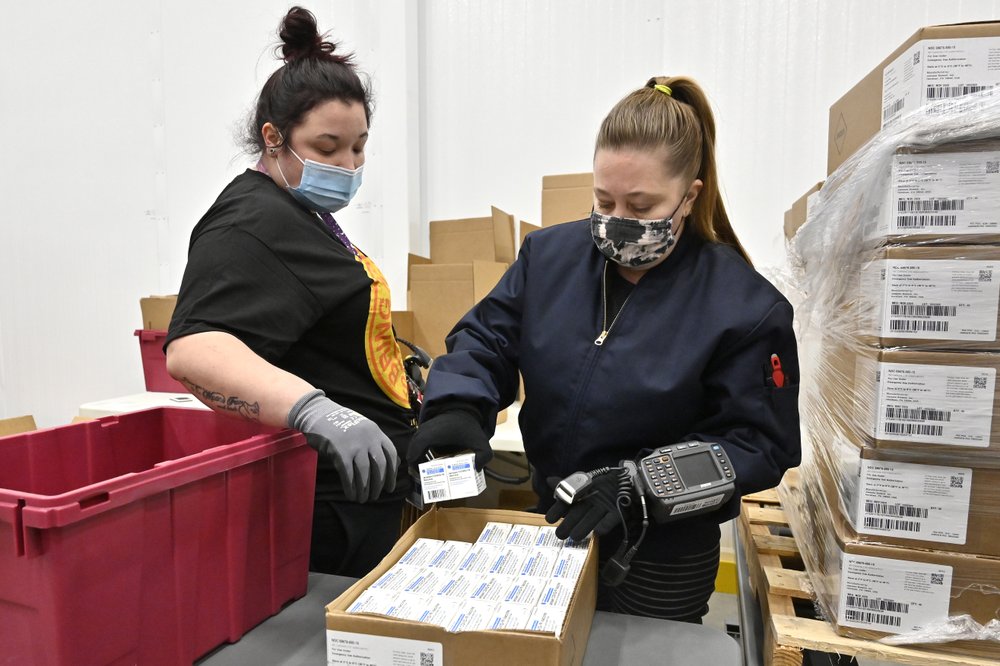
With the U.S. vaccination drive picking up speed and a third formula on the way, states eager to reopen for business are easing coronavirus restrictions despite warnings from health experts that the outbreak is far from over and that moving too quickly could prolong the misery. Massachusetts on Monday made it much easier to grab dinner and a show. In Missouri, where individual communities get to make the rules, the two biggest metropolitan areas — St. Louis and Kansas City — are relaxing some measures. Iowa’s governor recently lifted mask requirements and limits on the number of people allowed in bars and restaurants, while the town of Lawrence, home to the University of Kansas, now lets establishments stay open until midnight. Mike Lee, who owns Trezo Mare Restaurant & Lounge in Kansas City, said he hopes increased vaccine access, combined with warmer weather, will improve business. “I think that people are excited to put this past them and be able to start to get back to their ways of doing things,” Lee said. The push to reopen comes as COVID-19 vaccine shipments to the states are ramping up. Nearly 20% of the nation’s adults — or over 50 million people — have received at least one dose of vaccine, and 10% have been fully inoculated 2 1/2 months into the campaign to snuff out the virus, according to the Centers for Disease Control and Prevention. Johnson & Johnson shipped out nearly 4 million doses of its newly authorized, one-shot COVID-19 vaccine Sunday night to be delivered to states for use starting on Tuesday. The company will deliver about 16 million more doses by the end of March and a total of 100 million by the end of June. That adds to the supply being distributed by Pfizer and Moderna and should help the nation amass enough doses by midsummer to vaccinate all adults. The White House is encouraging Americans to take the first dose available to them, regardless of manufacturer. In New York City, where limited indoor dining has resumed, officials said the J&J vaccine will help the city to inoculate millions more people by summer, including through door-to-door vaccinations of homebound senior citizens. But the efforts come with strong warnings from health officials against reopening too quickly, as worrisome coronavirus variants spread. On Monday, the head of the CDC, Dr. Rochelle Walensky, urgently warned state officials and ordinary Americans not to let down their guard, saying she is “really worried about reports that more states are rolling back the exact public health measures that we have recommended.” “I remain deeply concerned about a potential shift in the trajectory of the pandemic,” she said. “We stand to completely lose the hard-earned ground that we have gained.” Cases and hospitalizations have plunged since the end of January, and deaths have also dropped sharply, but they are still running at dangerously high levels and have even risen slightly over the past several days. “We cannot be resigned to 70,000 cases a day and 2,000 daily deaths,” Walensky said. Overall, the outbreak has killed more than a half-million Americans. The vaccine already is contributing to a decrease in severe cases and deaths among older people, and is “quickly becoming a bigger contributor” nationally, Justin Lessler, an expert in infectious diseases at Johns Hopkins University, said in an email. “I suspect we will see it overtake natural infection as the biggest driver of immunity late spring earliest, more likely midsummer,” Lessler said. Dr. Amesh Adalja, an infectious disease specialist at Johns Hopkins University, said he believes states and cities have leeway to ease some restrictions because hospitals no longer are at capacity in most communities. But “I do think that masks are likely going to need to be kept in place for some time until we get more of our vulnerable populations vaccinated,” he said. “It is important for restaurants who are increasing their capacity to remember that we are still in a pandemic and to continue to follow some of those rules,” Adalja said. The Biden administration wants to see all three vaccines distributed evenly, while also acknowledging that the easy-to-handle J&J vaccine will be used in pop-up mobile sites and locations without freezer storage capacity. States are hoping that the surging vaccine supply will help tamp down new infections. In Massachusetts, Gov. Charlie Baker lifted restaurant capacity limits entirely. Theaters can open at 50% capacity, with a maximum of 500 people. And capacity limits across all businesses have been raised to 50%. Las Vegas on Monday became the latest of the nation’s largest school districts to return children to classrooms. Pre-K children to third graders will go back two days a week, with other grades to be phased in by early April. And in California, Gov. Gavin Newsom and legislative leaders reached an agreement aimed at getting most children back in classrooms by the end of March. Under the deal announced Monday, school districts could receive up to $6.6 billion if they reopen by March 31. The U.S. ranks fourth in the world, behind Israel, the United Arab Emirates, and Britain, in the number of doses administered relative to the population, according to data compiled by the University of Oxford. President Joe Biden fell well short of his goal of setting up 100 new federally operated mass-vaccination sites by the end of February, with just seven up and running. White House vaccination coordinator Jeff Zients also acknowledged that scheduling of vaccination appointments “remains too difficult in too many places.” But he said the White House is working with states to improve scheduling systems and is exploring federal support for call centers to make it easier for people to get appointments. Republished with the permission of the Associated Press.
Joe Biden chides Donald Trump for lack of cooperation on vaccine
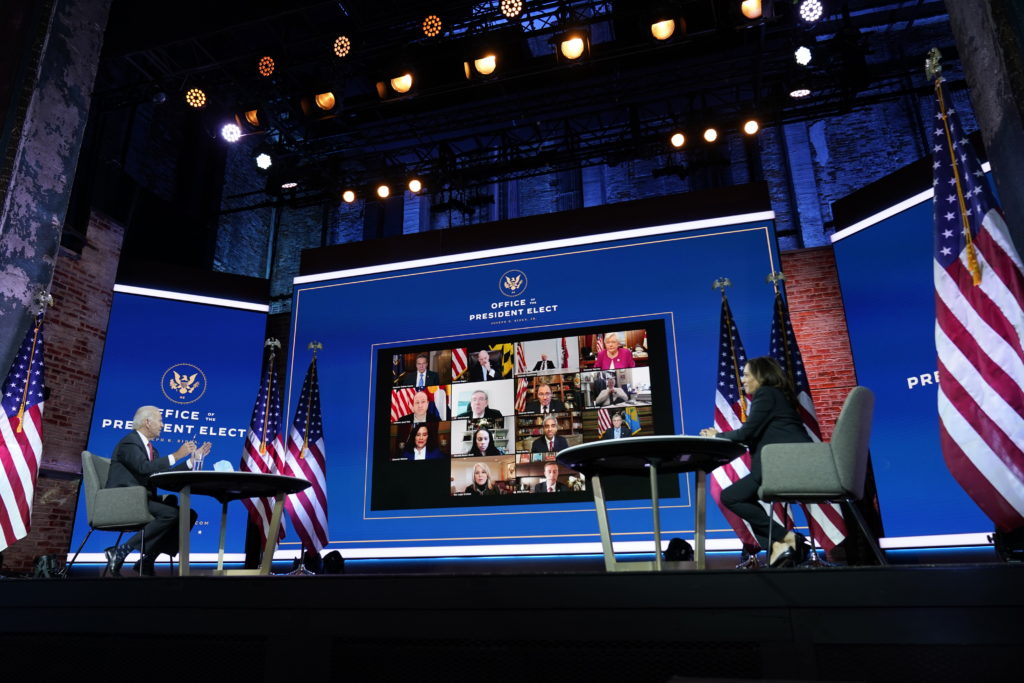
President-elect Joe Biden met Thursday with governors from both parties and criticized President Donald Trump’s unprecedented attempt to block the peaceful transition of power, saying it was hindering the flow of information about programs to develop a vitally important coronavirus vaccine. “Unfortunately, my administration hasn’t been able to get everything we need,” Biden said during a video conference with the National Governors Association’s leadership team, which consists of five Republicans and four Democrats. His remarks highlighted the stakes of the Trump administration’s refusal to begin a formal transfer of power to Biden’s team. Besides being a pillar of American democracy, it is especially important this year since Biden will be inheriting responsibility for managing the worst public health crisis in a century. The president-elect also has been denied access to other critical information, including security briefings. Participating from a theater in Wilmington, Delaware, with Vice President-elect Kamala Harris, Biden specifically cited Operation Warp Speed, the federal government’s partnership with private pharmaceutical companies to develop a COVID-19 vaccine. “We haven’t been able to get into Operation Warp Speed, but we will take what we learned today and build it into our plan,” Biden said in remarks after the meeting, which included Republicans Larry Hogan of Maryland, Asa Hutchinson of Arkansas, Kay Ivey of Alabama, Charlie Baker of Massachusetts and Gary Herbert of Utah. Afterward, Biden spoke about distribution of a vaccine once one is ready, saying, “There has to be a prioritization.” “That’s why I’d like to know exactly what this administration has in mind in terms of their Operation Warp Speed and how they plan it,” he said of the Trump White House. “And that’s what we talked about with the governors today. They all mentioned the need to focus on the communities that have been left behind.” Even as he warned of the gravity of the situation, however, Biden reiterated his previous pledges not to institute a nationwide shutdown to curb the virus’s spread and repeated that more states instituting mask-wearing mandates could save tens of thousands of lives. An hourlong briefing by the White House coronavirus task force that also took place Thursday made no mention of the incoming administration or Trump’s refusal to coordinate with Biden on plans to distribute upcoming vaccines. But it did reinforce Biden’s tough-love message to the American people, including warnings that a “dark winter” is coming as virus cases spike across the country. Task force coordinator Dr. Deborah Birx sounded the alarm over the rate of new infections — sharper than the surge this summer or even the initial outbreak last spring. While there have been improvements in treatment protocols and new therapeutics, tens of thousands of people — or more — will die before vaccines are widely available, she said. After the virtual meeting with the governors, Biden took questions from reporters and revealed he’d decided on a treasury secretary nomination for his new administration. He refused to provide more details, except to say it was a choice that would satisfy Democrats from across the political spectrum — presumably including outspoken progressives who worried Biden might go for a safer, more moderate selection. Among the Democrats on the videoconference was Gretchen Whitmer of Michigan, which is among the states Trump has targeted for unfounded claims of voter fraud. Biden nonetheless vowed to rise above politics in a unified front against the virus. “There’s a real desire for real partnership between the states and the federal government,” Biden said. He said he’d forgo a national shutdown “because every region, every area, every community can be different.” Instead, Biden noted that 10 governors have imposed statewide mask mandates to combat the virus, calling wearing face coverings a “patriotic duty.” He’s previously vowed to ask all governors to impose such rules and go around holdouts to local and county officials to cover as much of the U.S. as possible. Ivey told videoconference participants that both parties in Congress need to come together to provide more coronavirus response funding, according to a readout provided by her office. It made no mention of the Alabama governor recognizing Biden as president-elect. Hutchison of Arkansas, by contrast, said over the weekend that Biden would be the next president. He’s also called on the Trump administration to give Biden access to the intelligence briefings he needs to be fully prepared to lead the country on Jan. 20, Inauguration Day. Hogan told The Associated Press recently that Trump’s wild and unsupported claims of widespread voter fraud were “dangerous” and “embarrassing.” “As I said on the day that the president-elect was declared the winner, his election has provided a mandate for cooperation,” the Maryland governor said after the virtual meeting with Biden. “We look forward to working closely with the Biden-Harris administration as we continue to face this unprecedented global pandemic.” Still, some in his party, considering the election settled, didn’t stop Trump on Thursday from coming out with a new round of false claims of voter fraud in key states. With Trump dug in and Republicans on Capitol Hill largely unwilling to challenge him, Biden has been forced to turn to a diverse collection of outside allies to ratchet up the pressure on the president to concede. The CEOs of America’s largest companies have released a statement recognizing Biden and Harris as the clear winners. The heads of the American Hospital Association, the American Medical Association, and the American Nurses Association issued a joint statement on Tuesday urging the Trump administration to share “all critical information related to COVID-19” with Biden. Not doing so, they warned, would jeopardize American lives. Trump, meanwhile, has been getting nowhere in the courts, and his scattershot effort to overturn Biden’s victory is shifting toward obscure election boards that certify the vote. The battle is centered in the states that sealed Biden’s win. Two Republican election officials in Michigan’s largest county initially refused to certify results despite no evidence of fraud. The officials then backtracked and voted to certify before flipping again and saying they “remain opposed to certification.”
US governors feel heat to reopen from protesters, president
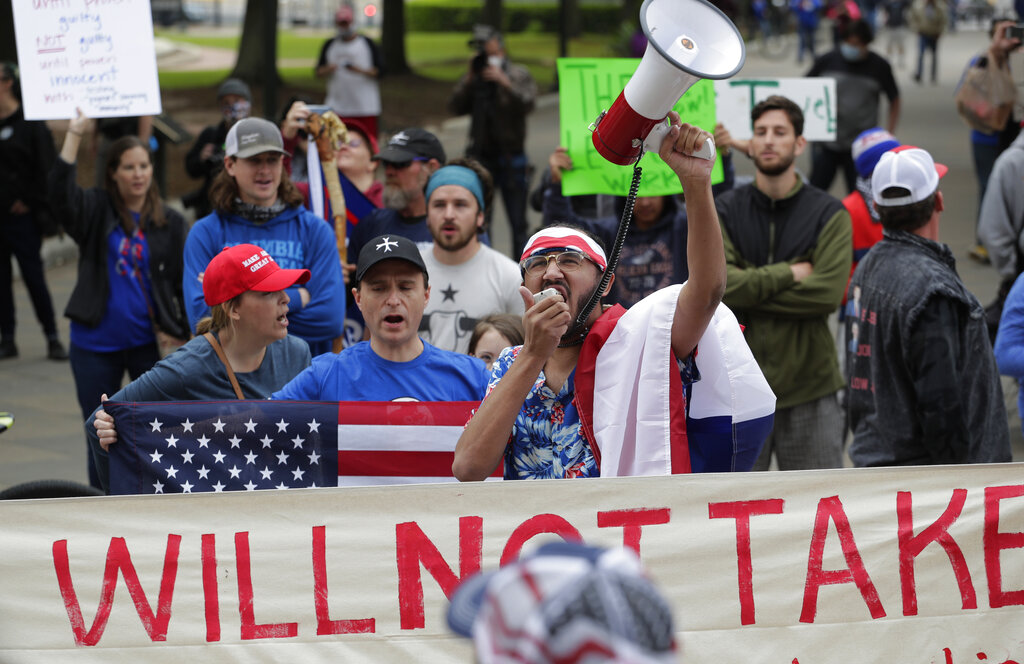
Adding to the pressure are protests against stay-at-home orders organized by small-government groups and Trump supporters.


